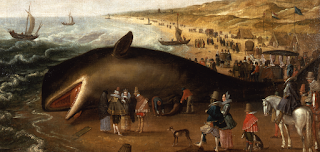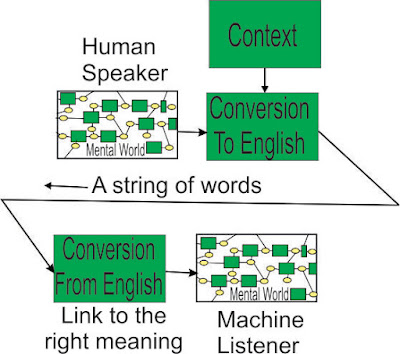Unconscious Meaning Integration
Using the analogy of a tennis player and their ability to modify a complex unconscious model they do not understand, we have been trying to look at how the unconscious mind shapes and integrates new meanings as it receives them. Here is an example.
Sense count: 1
Sense 0 Definition: run or haul up (a boat or ship) on to a beach
Example count: 1
Example 0: at the water's edge a rowing boat was beached
Sub Sense count: 3
Sub Sense 0
Definition: (of an angler) land (a fish) on a beach
Example count: 1
Example 0: he managed to beach a fine trout
Sub Sense 1
Definition: (of a whale or similar animal) become stranded out of the water
Example count: 1
Example 0: we don't know what causes whales to beach
Sub Sense 2
Definition: leave (someone) at a loss
Example count: 1
Example 0: competitive procurement seems to have beached several firms.
Note how the primary meaning is for a beached ship or boat, with sub meanings for fish, whales, and companies.
A beached whale is a very strong metaphor – leaving “someone at a loss” seems quite bland in comparison. In its day, a beached sailing ship was also a strong metaphor.
A meaning structure where a failure to match the head meaning means we need to search all the structure below, makes searching very inefficient.
We could claim that, while it is inefficient, the head meaning does illuminate the submeanings.
Possible, but beaching a “fine trout” is not the same as a beached ship or whale, so we don't want it illuminated, thanks.
We could create a meaning structure where the meanings are separate and independent:
Sense count: 4
Sense 0
Definition: run or haul up (a boat or ship) on to a beach
Sense 1
Definition: (of an angler) land (a fish) on a beach
Sense 2
Definition: (of a whale or similar animal) become stranded out of the water
Sense 3
Definition: leave (someone) at a loss
This throws away all the associations - the most obvious being between a whale and a company Sense 3).
The trouble with “a boat or ship” as the object being beached is the huge difference in energy it represents – a rowing boat or a "tinnie" is regularly beached as part of its use or storage – beaching a ship (Endeavour as an example, at 360 tons) is a totally different proposition.
If we had a head meaning:
Definition: a large and powerful object rendered stranded and powerless
It would work for a ship or whale or company, but not for a rowboat or trout.
Sense count: 2
Sense 0
Definition: a large and powerful object rendered powerless
Sub Sense count: 3
Sub Sense 0
Definition: run or haul up (a ship) on to a beach
Example count: 1
Example 0: a sailing ship was beached for repairs
Sub Sense 1
Definition: (of a whale or similar animal) become stranded out of the water
Example count: 1
Example 0: we don't know what causes whales to beach
Sub Sense 2
Definition: leave (a powerful individual or company) stranded
Example count: 1
Example 0: competitive procurement seems to have beached several firms.
And then another head meaning:
Sense 1 Definition: a small object being immobilised on a beach
Sub Sense count: 2
Sub Sense 0
Definition: run or haul up (a boat) on to a beach
Example count: 1
Example 0: a rowing boat was beached
Sub Sense 1
Definition: (of an angler) land (a fish) on a beach
Example count: 1
Example 0: he managed to beach a fine trout
Life’s a Beach
Here is Oxford’s machine interface take on the verb “beach”. It uses senses and sub senses - that is, a depth of two (something that may be satisfactory for words with a few meaning, but probably not for words with 50 to 70 meanings). We will come back to that later, when we take on "run" and "cut".Sense count: 1
Sense 0 Definition: run or haul up (a boat or ship) on to a beach
Example count: 1
Example 0: at the water's edge a rowing boat was beached
Sub Sense count: 3
Sub Sense 0
Definition: (of an angler) land (a fish) on a beach
Example count: 1
Example 0: he managed to beach a fine trout
Sub Sense 1
Definition: (of a whale or similar animal) become stranded out of the water
Example count: 1
Example 0: we don't know what causes whales to beach
Sub Sense 2
Definition: leave (someone) at a loss
Example count: 1
Example 0: competitive procurement seems to have beached several firms.
Note how the primary meaning is for a beached ship or boat, with sub meanings for fish, whales, and companies.
A beached whale is a very strong metaphor – leaving “someone at a loss” seems quite bland in comparison. In its day, a beached sailing ship was also a strong metaphor.
A meaning structure where a failure to match the head meaning means we need to search all the structure below, makes searching very inefficient.
We could claim that, while it is inefficient, the head meaning does illuminate the submeanings.
Possible, but beaching a “fine trout” is not the same as a beached ship or whale, so we don't want it illuminated, thanks.
We could create a meaning structure where the meanings are separate and independent:
Sense count: 4
Sense 0
Definition: run or haul up (a boat or ship) on to a beach
Sense 1
Definition: (of an angler) land (a fish) on a beach
Sense 2
Definition: (of a whale or similar animal) become stranded out of the water
Sense 3
Definition: leave (someone) at a loss
This throws away all the associations - the most obvious being between a whale and a company Sense 3).
The trouble with “a boat or ship” as the object being beached is the huge difference in energy it represents – a rowing boat or a "tinnie" is regularly beached as part of its use or storage – beaching a ship (Endeavour as an example, at 360 tons) is a totally different proposition.
If we had a head meaning:
Definition: a large and powerful object rendered stranded and powerless
It would work for a ship or whale or company, but not for a rowboat or trout.
Sense count: 2
Sense 0
Definition: a large and powerful object rendered powerless
Sub Sense count: 3
Sub Sense 0
Definition: run or haul up (a ship) on to a beach
Example count: 1
Example 0: a sailing ship was beached for repairs
Sub Sense 1
Definition: (of a whale or similar animal) become stranded out of the water
Example count: 1
Example 0: we don't know what causes whales to beach
Sub Sense 2
Definition: leave (a powerful individual or company) stranded
Example count: 1
Example 0: competitive procurement seems to have beached several firms.
And then another head meaning:
Sense 1 Definition: a small object being immobilised on a beach
Sub Sense count: 2
Sub Sense 0
Definition: run or haul up (a boat) on to a beach
Example count: 1
Example 0: a rowing boat was beached
Sub Sense 1
Definition: (of an angler) land (a fish) on a beach
Example count: 1
Example 0: he managed to beach a fine trout



Comments
Post a Comment